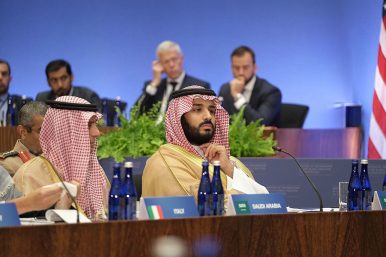 The success or failure of Saudi Arabia’s reform campaign will have huge ramifications for China.
The success or failure of Saudi Arabia’s reform campaign will have huge ramifications for China.
Saudi Arabia had a busy weekend. On Saturday, November 4, dozens of princes, billionaires, ministers, and former top officials were arrested in Riyadh for running afoul of an anti-corruption campaign, opposing Saudi Crown Prince Mohammed bin Salman’s reform program, or both. Later that night, Iranian-backed Houthi fighters in Yemen appear to have fired a ballistic missile at the civilian airport in Riyadh on Saturday. On November 5, Prince Mansour bin Muqrin, a provincial deputy governor and son of a former intelligence chief, was killed in a helicopter crash near the Yemen border; the cause of the crash is still unknown. The implications of these events will likely become clearer over time, but occur in the context of a historic reform campaign that will affect Saudi Arabia, China, the West, the Islamic world, and the global economy for decades.
The Saudi reform program is serious. Gasoline subsidies are set to taper off gradually while women will be legally allowed to drive starting in June 2018. These economic and social reforms will dramatically enhance the competitiveness of the Saudi economy. The legal right to drive will reduce employment barriers for Saudi women, increase labor force participation, and add billions (potentially tens of billions) of dollars to the Saudi economy. Saudi Arabia has also launched creative programs, including cash handouts to citizens – universal basic income – and funded citizen educational development: in 2015 nearly 200,000 Saudi students, or approximately 0.7 percent of Saudi Arabia’s total population, studied abroad. Despite budgetary pressures from low oil prices, education spending has remained a priority, educational attainment is skyrocketing, the economy is increasingly diverse and competitive, and society is gradually opening. Saudi Arabia appears to generally be moving in a very positive direction under Saudi Crown Prince Mohammed bin Salman, although uncertainties remain.
Developments in Saudi Arabia, the world’s largest or second largest oil producer, will have major implications for China, the world’s largest oil importer. China has an interest in low oil prices: every dollar increase in the price of oil suppresses Chinese economic activity by billions of dollars. A 2015 IMF study projected that lower oil prices would, by 2020, increase global GDP between 0.4 and 0.6 percent and Chinese GDP specifically would rise between 0.5 and 2.0 percent. Other studies (in Chinese) suggest that low commodity prices save the Chinese economy approximately $460 billion per year.
Political instability in Saudi Arabia could have profound consequences for world energy markets and the global economy, as a shock to Saudi production would lead to higher oil prices and inflation while almost immediately reducing global GDP and employment. The 1973 oil crisis led to 9 percent unemployment in the United States in under two years. A similar price shock would produce comparable impacts on the Chinese (and global) economy. In a notable development, China has reportedly offered to buy 5 percent of Aramco, the Saudi state-owned oil company, in a deal valued at up to $100 billion.
Saudi Arabia and China may also enjoy natural synergies in solar power. China is, by far, the world’s largest producer of solar energy, while sun-soaked Saudi Arabia enjoys a comparative advantage in solar production. Increasing Saudi Arabia’s solar power production could reduce the Kingdom’s domestic oil consumption, free up oil production for export abroad, and lower global oil prices – all while supporting the development of China’s domestic solar industry and the fight against climate change. Saudi Arabia’s emergence as an oil and solar exporting powerhouse could lead to enormous benefits for both sides and, indeed, the global economy.
Saudi Arabia’s importance outstrips its GDP or population size. While a disruption in Saudi oil production would almost surely lead to 1970s-style global stagflation, successful reform and opening up in Saudi Arabia would not only reduce energy prices but could also serve as a model for other oil producers seeking to adopt responsible, pro-market policies. Finally, and perhaps most importantly, developments in Saudi Arabia, home to Mecca, Medina, and other holy sites, will reverberate throughout the Islamic world. There are approximately 1.6 billion Muslim individuals and by 2050 the number of Muslim adherents is projected to reach 2.76 billion, or nearly 30 percent of the global population. China’s expanding global role will lead to more interactions with Muslim-majority societies in Pakistan, Indonesia, Malaysia, Iran, and beyond. China’s future relations with Islamic countries will be shaped, in part, by near-term developments within Saudi Arabia.
China has a unique – and possibly highly constructive – role to play in Gulf security. In the short term, visits from high-level Chinese officials to Saudi Arabia (and finalizing some of the $70 billion in China-Saudi deals) could bolster support for the Crown Prince’s reform program. China has highly workable relationships with Saudi Arabia, Qatar, and Iran, and could play an important role in facilitating dialogue and reducing tensions across the region.
The success or failure of Saudi Crown Prince Mohammed bin Salman’s reform program will have implications for the global economy and the future of political Islam. The reforms may represent a once-in-a-lifetime opportunity to balance Islamic traditions with modern imperatives. Failure by China (or the West) to sufficiently support the reforms could prove to be a historic mistake.
Wang Mouzhou is the pen name of a former NSA intelligence officer. All articles reflect the former NSA intelligence officer’s personal opinions only.
Thediplomat.com, November 09, 2017




